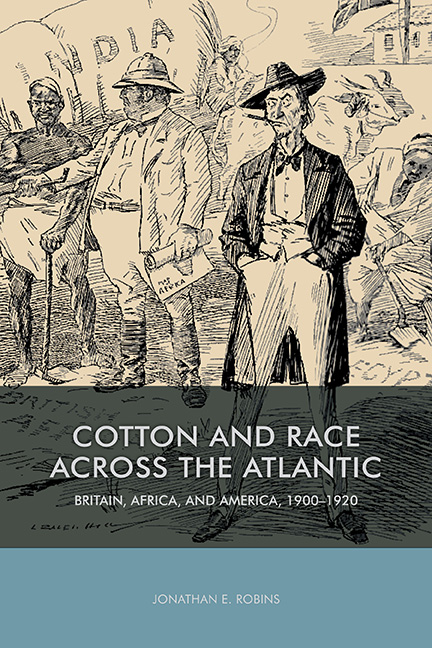Book contents
- Frontmatter
- Contents
- List of Illustrations
- Preface
- Abbreviations
- Introduction
- 1 The Cotton Crisis: Lancashire, the American South, and the Turn to “Empire Cotton”
- 2 “The Black Man's Crop”: The British Cotton Growing Association and Africa
- 3 “The Scientific Redemption of Africa”: Coercion and Regulation in Colonial Agriculture
- 4 “King Cotton's Impoverished Retinue”: Making Cotton a “White Man's Crop” in the American South
- 5 Cotton, Development, and the “Imperial Burden”
- Notes
- Bibliography
- Index
- Frontmatter
- Contents
- List of Illustrations
- Preface
- Abbreviations
- Introduction
- 1 The Cotton Crisis: Lancashire, the American South, and the Turn to “Empire Cotton”
- 2 “The Black Man's Crop”: The British Cotton Growing Association and Africa
- 3 “The Scientific Redemption of Africa”: Coercion and Regulation in Colonial Agriculture
- 4 “King Cotton's Impoverished Retinue”: Making Cotton a “White Man's Crop” in the American South
- 5 Cotton, Development, and the “Imperial Burden”
- Notes
- Bibliography
- Index
Summary
John Wesley Hoffman arrived in Lagos on a spring day in 1903 to begin what his employer called “missionary work” among the people of southern Nigeria. Hoffman was not in Africa to win souls for the Lord; his task was to preach the gospel of commercial agriculture and win converts to the cause of cotton growing. Hoffman was regarded by some as “the leading Negro scientist of the world” and had taught at several colleges serving the African American population of the southern United States. He had worked with famous educators like Booker T. Washington at the Tuskegee Institute and could boast of a string of accomplishments in microbiology, human nutrition, and plant breeding. Hoffman was convinced that cotton cultivation—along with a Tuskegee-style education in applied science and disciplined work—was the first step toward the economic development of Africa.
Hoffman was not the first Tuskegee scientist in Africa. Several of his colleagues had been hired by Germany's Colonial Economic Committee (KWK) to start a cotton industry in Togo two years earlier, and they would soon meet with some success in creating a cotton export industry in the small West African colony. Hoffman's employer, the British Cotton Growing Association (BCGA), had bigger plans than the KWK, however. They hired the most distinguished African American scientist they could find and sent him to Nigeria, a recently conquered British colony with vast tracts of fertile land and the largest population in West Africa. (The fact that Hoffman's most important scientific work dealt with dairy microbes did not concern his British patrons.) By educating Nigerians in the latest agricultural knowledge and encouraging them to embrace commodity production for the world market, Hoffman and his backers believed they could rapidly transform Nigeria into one of the world's largest cotton producers. Like Hoffman, many in the African diaspora believed that the economic development of Africa was a critical precondition for the political and economic rejuvenation of black peoples around the Atlantic. Boosters of the cotton-growing movement declared that Hoffman's work “stirred hopes of a future for the race, [and] had awakened dreams hitherto foreign to these Africans, so lately emerged from a darkness as deep as their jungles.”
- Type
- Chapter
- Information
- Cotton and Race across the AtlanticBritain, Africa, and America, 1900–1920, pp. 1 - 29Publisher: Boydell & BrewerPrint publication year: 2016



